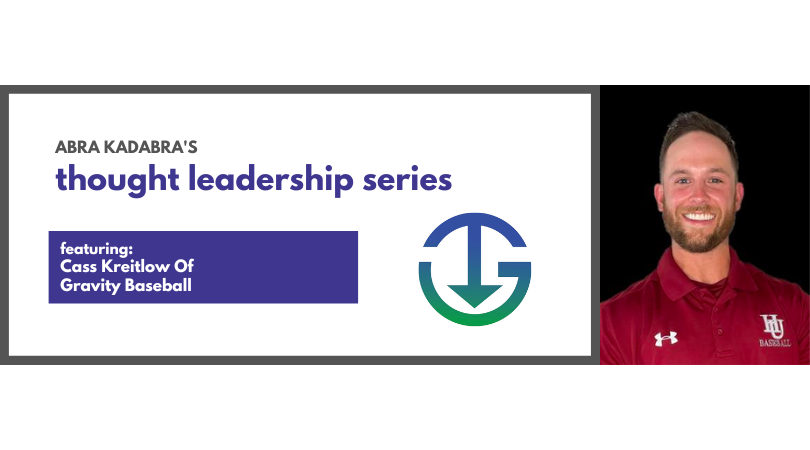Not everyone can turn a childhood passion into a thriving career, but that’s exactly what Cass Kreitlow has done.
Kreitlow, the owner of Minnesota-based Gravity Baseball, has played the sport since he was three years old. In addition to baseball, he was a multi-sport athlete in high school who played hockey, basketball, football and was on the wrestling team. But wait – there’s more! He was also in band, choir, National Honor Society…you name it, he was probably involved in some way.
“I was that kid,” Kreitlow said with a laugh. “I was part of everything.”
So how did Kreitlow decide to narrow his focus to baseball? Well, he got some great advice from a friend who happened to be a professional baseball player and had also excelled in basketball.
“He said the difference between baseball and basketball for him was that even though he was actually more talented at basketball, he could practice baseball all day long,” Kreitlow recalled. “That was exactly what baseball was for me. I was really good at football and I was decent at the other sports I played, but I realized baseball was what I enjoyed the most. If you would have said to me ‘Cass, can we go play catch every single day all summer long?’ I would have said ‘absolutely.’”
Baseball never felt like work to Kreitlow, even when he joined the team at Hamline University and spent many hours in the gym doing strength and conditioning work. This was also when he started getting involved in coaching, doing camps and clinics to earn a little extra money.
“What made me think that I could coach in the first place was that I came in at the bottom of the depth chart and I barely pitched at all my freshman year,” Kreitlow said. “And when I graduated in 2011, I was at the top of the depth chart.”
At that point, having earned his degree in communications, it was time for Kreitlow to look for a job, but he wasn’t exactly sure what he wanted to do.
“I tried finance for about 18 months and the good thing about that was that I learned all about business, money, insurance and networking,” Kreitlow said. “Then I realized if I could put that much time and energy into something like finance, which I was not passionate about, I could easily pour that into baseball.”
Kreitlow decided to go back into coaching, but it didn’t quite pay all the bills, which he said isn’t uncommon for that type of job.
“Most of the people who get into coaching didn’t play professional baseball,” Kreitlow noted. “And they usually have to have two jobs to start. For example, I was serving in a restaurant and many of my friends and competitors in this industry were doing the same. This was our ‘B’ job until we could turn it into an ‘A’ job.”
In 2014, he decided it made sense to go full-time into coaching and after eight years working for other people, he launched Gravity Baseball in 2022. Now, he coaches clients of all ages and abilities in both baseball and softball and enjoys helping them improve their skills while also boosting their confidence. Talk about making your dreams come true, right?
If you’re reading this and you have children who are interested in getting into youth sports – or they are already – here are a few of Kreitlow’s thoughts and suggestions:
- Try as many sports as possible early on…and then pick one: At ages 12 and under, it makes sense to have kids try a variety of different sports to see what they enjoy and where their talents may lie. However, unlike in previous decades where young people were encouraged to play multiple sports for a long period of time, now the pendulum has swung in the opposite direction. Therefore, after exposing your kids to different sports when they’re young, Kreitlow recommends picking one to focus on. “You need to recognize what sport your kid is gravitating toward early or they’re going to be left behind in the sport that they’re passionate about,” he said. “People often misunderstand that multi-sport athletes sometimes don’t get what they want because they didn’t pick a sport soon enough. And what ends up happening is that they become ‘kind of’ good at three sports instead of being really good at the sport they love.”
- Create consistency: If your children are still in the multiple sport stage of life, make sure that they’re not “shutting off” one of their sports during the off season. “I think that’s the thing that people miss in sports. You’re actually trying to prime your child’s lifestyle changes down the road,” he said. “You’re not just going to care about what they eat or how much they exercise six out of the 12 months of the year. You need to be consistent all year long.” For example, if Kreitlow was coaching a kid who played hockey, after baseball practice ended, he’d encourage him to spend 10 minutes shooting some pucks into the net. “They should be working on the things that they worked on during their last season so they don’t lose that skill set,” he said. “It’s really hard to maintain momentum if all of a sudden they just don’t pick up whatever sport they’re doing for three to six months.”
- Assume that your child is actually trying: It may not always look like it, but Kreitlow advises parents to always assume their child is trying. After all, sometimes there are underlying physical issues that can impact performance. Let’s say your child is up to bat and watches three pitches go right down the middle without swinging at them. From a parent’s perspective, that can be discouraging and frustrating. “Why isn’t my child being more aggressive?” the parent may wonder. But because Kreitlow is an experienced coach, he understands how the body is supposed to work and he can see the real reasons why that child isn’t ready to hit the ball. “I have the skill set to see how physical problems can look like mental problems and I know not to ream a kid when they make physical mistakes,” he said. “Assume good intentions and that there’s a really logical reason why your children may not be performing at their best. Be patient and curious to really find out what might be the underlying root of the problem. And always remember the golden rule.”
- Support your children by giving them your time: Kreitlow has clients who will pay him to train their kids but they won’t go play catch with them in the backyard. If you really want to support your children, take some time out of your schedule to toss a baseball or kick a soccer ball with them. “Usually, the foundation of every talented kid that I’ve ever had is that their parents are really, really supportive and they go out of their way to help that child with the fundamentals,” he said. “I really encourage that.” And what does he say to the parents who tell him “I can’t coach my kid?” Well, it’s quite simple. “I always say ‘who said anything about coaching your kid?’ Just go spend time with your kid playing a game that you both love.”
To learn more about Gravity Baseball, visit https://www.instagram.com/gravitybaseball/reels/
Abra Kadabra Environmental Services is proud to share the wisdom of business owners from our community through our thought leadership series. If you’d like to be featured, click here.







